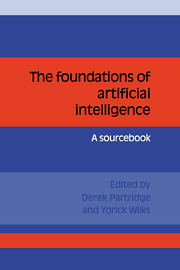Book contents
- Frontmatter
- Contents
- List of contributors
- Preface
- Acknowledgments
- 1 Introduction
- 2 The formal foundations of AI
- 3 Levels of theory
- 4 Programs and theories
- 5 The role of representations
- 6 The role of programs in AI
- 7 Rational reconstruction as an AI methodology
- 8 Is AI special in regard to its methodology?
- 9 Does connectionism provide a new paradigm for AI?
- 10 The role of correctness in AI
- 11 Limitations on current AI technology
- The challenge of open systems
- Towards a reconciliation of phenomenology and AI
- The superarticulacy phenomenon in the context of software manufacture
- 12 Annotated bibliography on the foundations of AI
- Index of names
Towards a reconciliation of phenomenology and AI
Published online by Cambridge University Press: 03 May 2010
- Frontmatter
- Contents
- List of contributors
- Preface
- Acknowledgments
- 1 Introduction
- 2 The formal foundations of AI
- 3 Levels of theory
- 4 Programs and theories
- 5 The role of representations
- 6 The role of programs in AI
- 7 Rational reconstruction as an AI methodology
- 8 Is AI special in regard to its methodology?
- 9 Does connectionism provide a new paradigm for AI?
- 10 The role of correctness in AI
- 11 Limitations on current AI technology
- The challenge of open systems
- Towards a reconciliation of phenomenology and AI
- The superarticulacy phenomenon in the context of software manufacture
- 12 Annotated bibliography on the foundations of AI
- Index of names
Summary
The traditional account of skills
The rationalist philosophical tradition which descends from Socrates, to Plato, to Leibniz, to Kant, to conventional AI and knowledge engineering takes it for granted that understanding a domain consists in having a theory about that domain. A theory formulates the relationships between objective, context-free features (attributes, factors, data points, cues, etc.) in terms of abstract principles (covering laws, rules, programs, etc.) As this tradition develops, even everyday practice is assumed to be based on unconscious theory.
In one of his earliest dialogues, The Euthyphro, Plato tells us of an encounter between Socrates and Euthyphro, a religious prophet and so an expert on pious behavior. Socrates asks Euthyphro to tell him how to recognize piety: “I want to know what is characteristic of piety … to use as a standard whereby to judge your actions and those of other men.” But instead of revealing his piety-recognizing principles, Euthyphro does just what every expert does when cornered by Socrates. He gives him examples from his field of expertise; in this case situations in the past in which men and gods have done things which everyone considers pious. Socrates persists throughout the dialogue in demanding that Euthyphro tell him his rules, but although Euthyphro claims he knows how to tell pious acts from impious ones, he cannot state the rules which generate his judgments. Socrates ran into the same problem with craftsmen, poets, and even statesmen. None could articulate the theory underlying his behavior.
- Type
- Chapter
- Information
- The Foundations of Artificial IntelligenceA Sourcebook, pp. 396 - 410Publisher: Cambridge University PressPrint publication year: 1990
- 3
- Cited by

